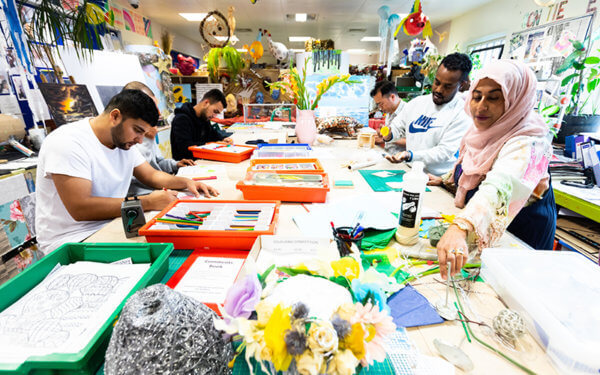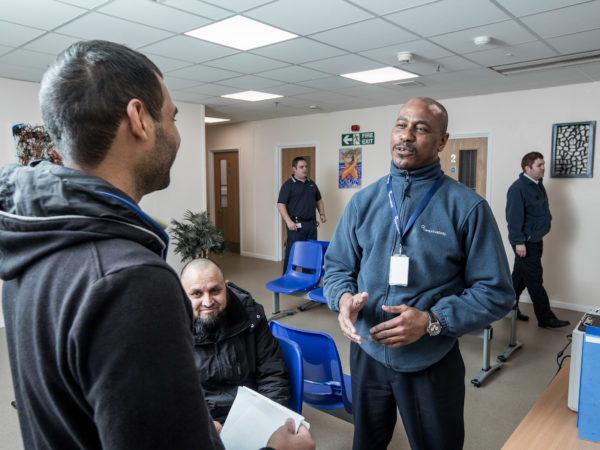Why rethinking prisons can boost rehabilitation

Common misconceptions about prisons could be holding back rehabilitation efforts.
This is the opinion of Mitie’s Director of HMP Millsike, Samantha Pariser, who has over 20 years’ experience in the prison sector.
For this Perspectives article, Samantha sets out the approach she feels gives prisoners in our care the tools to turn their lives around.
I never planned to work in prisons. In fact, my first job after university was with a large banking organisation. On the surface it seemed ideal, but I found the work just wasn’t for me and wanted to do something more worthwhile.
While leafing through a Saturday newspaper supplement, I spotted a graduate scheme with HM Prison and Probation Service. Around 2,000 people applied, and I was one of 18 lucky recruits. I took a leap of faith and 24 years later, I haven’t looked back. This is a vocation focused on trying to help people become better. Over the years I’ve encountered my own adverse situations, but you learn to manage them safely. And despite the sometimes-challenging environment, you really can’t do this role unless you love it.
Change for good
I’ve seen a lot of change in the UK prison sector since my days as an officer. There is a big move towards understanding the reasons people offend and working on ways to prevent reoffending. In the first few years of my career, I’m not sure that received much focus at all.
I’m aware of critics who claim measures to assist prisoners have gone too far and that a harsher environment is necessary. However, the ‘lock the door and throw away the key’ attitude doesn’t take into account the realities of prisons and rehabilitation. Over time working in this environment you realise: “It could be me or someone I love.”
Regardless of what many people would like to think, prison isn’t something that happens to other people. Anyone can end up with a custodial sentence. They shouldn’t be dehumanised or disregarded. Their punishment is being committed to custody and it’s our job to support them to contribute to society upon release, helping prevent a return visit.
Recent Government figures show 59.2% of adults released from sentences of less than 12 months will go on to reoffend. I don’t see a problem in being caring if it helps reduce the rate of reoffending.

Doing things differently
A commitment to rehabilitation informs my approach as Director of HMP Millsike, the UK’s first all-electric prison. By early next year, we’ll reach our full capacity of around 1,500 category C prisoners.
During the last 20 years, I’ve watched the infiltration of drugs into UK prisons. This has brought trauma, death, and difficult circumstances for prison staff. Of course, drugs shouldn’t be getting in, but the process has become a business in itself. Substances are even dropped off by drones, and although the risk is high, organised crime gangs clearly believe it’s a risk worth taking because the reward is higher.
HMP Millsike’s answer is Houseblock E: drug-free accommodation in an incentivised substance-free living unit. This will be led by our partner, the Forward Trust charity. It’s an on-site community, where prisoners will be subjected to regular tests in order to stay there. This puts coming off drugs within reach and means time in custody becomes part of the recovery journey.
Specialist partners
Mitie has assembled a range of partners to support in specialist areas of HMP Millsike. I’ve already mentioned Forward Trust, whose Connections services promote healthy relationships, wellbeing, recovery and desistance. This includes the More Than My Past programme, which will be delivered for the men accommodated in the incentivised substance-free living unit.
PeoplePlus oversee education, skills and work. Lived experience colleagues such as the former prisoner, Gethin Jones, bring their own experience to the rehabilitation-focused Hope Programme. Our shared aim is to show prisoners that there is another way. Options are available to move in a different direction and to contribute to society on release.

Harnessing positive power of tech
Some critics focus on the technology prisoners can access in custody. Of course, restrictions must be in place, but preventing use of technology is extremely shortsighted. Just think how fast things are developing. And then think how long some people spend in jail. If individuals can’t keep up with technology, they’ll be released with a massive disadvantage, which prevents their assimilation into society.
At HMP Millsike, we’ve worked with the Ministry of Justice to get things right. So, there is a secure resident Wi-Fi network throughout the prison and prisoners are provided with secure, in-cell tablets. With these they can manage visits from friends and family and other aspects of their daily lives. If prisoners want to study, a range of courses can be uploaded and progress tracked. It’s also possible to book video calls with friends and family, which keeps those all-important connections alive.
We’re doing things differently to break that cycle of addiction and reoffending, helping people put their lives back together. After 20 years in UK prisons, I’m proud of an approach that focuses on successful rehabilitation.
Read next

Soft power is key to solid prisoner transformation
Over many years working with prisoners, I have never wavered from my belief in a restorative, rehabilitative culture. People may mutter about this being the soft approach, but I would argue to the contrary….

Home Office: Heathrow Immigration Removal Centre
We’ve established a unified, positive culture and this contract has confirmed our role as a strategic partner to the Home Office.
Mitie appointed to the Prison Operator Services framework
Mitie’s Care & Custody division has been named as a supplier on the Prison Operator Services (POS) framework.
 Skip to content
Skip to content
